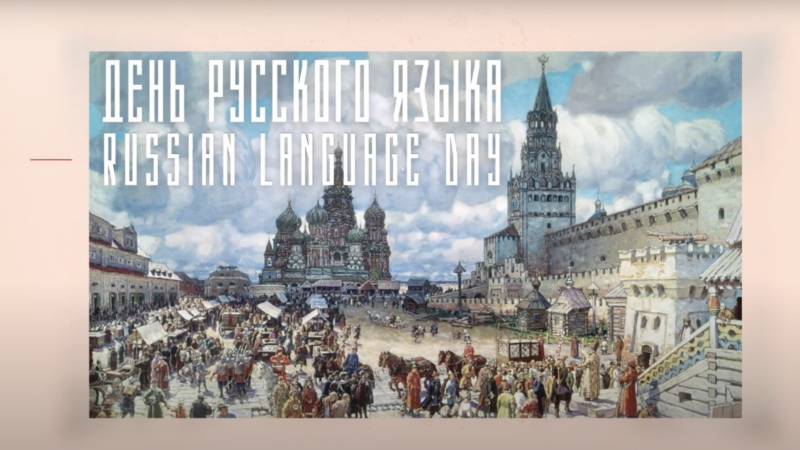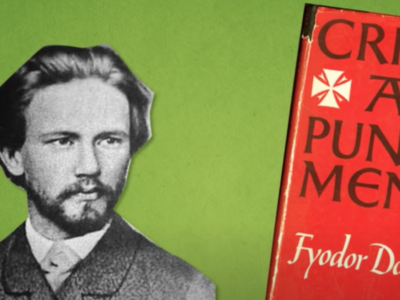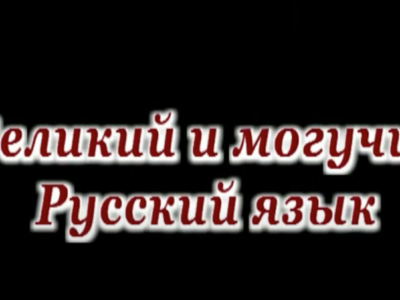
From the UN Geneva YouTube video marking Russian Language day.
June 6 was declared International Russian language day by the United Nations in 2010 to coincide with the birthday of Aleksandr Pushkin, considered the father of modern Russian literature.
In terms of speakers, Russian is listed as the eighth most spoken language in the world, with an estimated total of nearly 260 million native and fluent speakers. It is still present to very different degrees in all 15 countries that were part of the Soviet Union until 1991 and is also one of the six official languages of the United Nations.
At the same time, the Kremlin is using the Russian language as a pretext to frame its full-scale invasion of Ukraine that started on February 24, 2022. It has also been a language of colonization and oppression for centuries in many parts of the world: Central Asia, the South Caucasus, Eastern and Central Europe, the Baltic states, and Finland.
And it is also the language in which thousands of students from the Global South were educated, usually for free, from the 1920s to the 1960s in the Soviet Union. This explains why certain generations in Cuba, Mongolia, the DRC, China, India, and Vietnam still speak it fluently.
Russian in the Slavonic family of languages
Russian is part of the East Slavic languages that emerged after the 12–13th centuries as spoken languages from what is known as Old Church Slavonic — the written language used in Kyivian Rus to translate and spread Christianity by using the then newly formed Cyrillic alphabet. Other East Slavic languages are Belarusian and Ukrainian, and there are also different creoles mixing, for example, Ukrainian and Russian, known as “surzhyk.”
In 1917, Russian underwent a major spelling reform, getting rid of several letters. The modern Russian alphabet has 33 letters.
One particularity of Russian is a parallel language called “mat” that has origins in profane and obscene language and expressions. It became more widespread in Stalin’s Gulag system, wherein millions of people of diverse ethnic origins were imprisoned and killed. Most of them spoke Russian as well as many other languages and lived among criminals who used mat sometimes as a code language to disguise their work.
Russian as a colonial language
Tsarist Russia started colonizing large territories populated by indigenous people — mostly in the East and North and later in the South from the late 16th century. Russian Orthodox faith and Russian language education in the army and schools served as the main instruments to impose Russian as a “superior language” and a tool for social and economic advancement. During this period, Tsarist authorities also started banning the use of certain languages in print or in education, as was the case for Ukrainian.
At the same the nobility and the very top elites of Russian society disregarded Russian as a coarse language of the people, preferring French. Pushkin’s first language was not Russian but French, and he only learned Russian when he was ten, thanks to his nanny.
Russian as a language of decolonization and oppression
After the 1917 Bolshevik Revolution, the official narrative called for all nations of the former Tsarist Empire to have the right to use their language. Enthusiastic linguists also created alphabets for non-written languages, but as Stalin monopolized absolute power from the 1930s, Russian was deemed the language of Communism and progress, meant to eventually replace all other languages as a medium of peace, communication, and education for all. That aspect was extended to thousands of students from the global south who could study in Russian and access the Soviet Union to become doctors, engineers, researchers, professors, and artists.
Parallel to this reality, the Russian language was used to suppress local language, culture, and identity not just across the Soviet Union but also in Central Europe, where it was made compulsory in all state schools in places like Hungary and Czechoslovakia that had been crushed by Soviet-led invasions in the 1950s and 1960s. Knowing Russian well was a precondition to prestigious careers in all fields and could also open the doors to prestigious studies in the Soviet Union.
Instrumentalizing Russian
When the USSR dissolved in 1991, Russian was still the main language of communication among post-Soviet countries for some time. Yet very rapidly, each country took its own linguistic course based on the proportion of ethnic non-Russians, and proximity with other cultures and languages (Turkic, Romance, Nordic). Today Russia has official status in Belarus, Kazakhstan, Kyrgyzstan, and of course, Russia.
In other countries, the use of Russian largely depends on local politics, the number of native Russian speakers still living in the country, and whether Russia is or was regarded as a destination for migration or education. Thus it is still present in Armenia, Azerbaijan, Moldova, Tajikistan, and Uzbekistan — and very limited in Estonia, Latvia, Lithuania (except for the ethnic Russian minority), Georgia, and Turkmenistan.
Ukraine is, of course, now a special case as it had a large number of Russian and bilingual speakers as part of the Soviet colonization until 1991. The first and second invasions by Russia in 2014 and 2022 were justified by the need to “protect Russian-speakers” even though they always were able to speak Russian at home and in public spaces — and still do to this day in Ukraine. Today large numbers of Ukrainians who use both languages or even predominantly Russian are switching to speaking and writing in Ukrainian only as a result of Russia’s aggression.
Stories about Russian: a language constantly instrumentalized by ideologies
Turning point? The ethnicization of social issues and what Indigenous communities think about it in Russia
Research by Vlada Baranova claims that the war in Ukraine has led to the ethnicization of conflicts and confrontation between the federal authorities, perceived as “Russian,” and the Indigenous population.
Education for the Romani people: Failed by both empires
Sociological data show that about 80% of Roma children after the age of 11 do not attend school, which is similar to peasant families in pre-industrial, pre-revolutionary Russia
How I ended up despising my mother tongue in Ukraine
Attempts to explain our position to war supporters in Russia failed in the first months of 2022, and using Russian now evokes the trauma of that total non-understanding and aggressive denial.
‘Central Asian literature exists regionally only in Russian': Interview with Russophone Uyghur writer Ramil Niyazov-Adyldzhyan
While the majority of Uyghur people live in China, a large Uyghur diaspora lives in Central Asia, including in Kazakhstan, where they are freer to express themselves.
How the war in Ukraine twisted my tongue
After Russia invaded for a second time on February 24, 2022, I found myself wondering what to do with the part of my brain that still speaks Russian every day.
A Buryat voice calling on Russia to decolonize : Interview with Instagrammer Seseg Jigjitova
According to statistics, Russia is home to over 190 ethnic groups in which ethnic Russians account for around 80 percent of the total 146 million population. Yet Moscow maintains a...
The struggle to maintain an independent russophone voice in Moldova
In de facto bilingual Moldova, russophone media Newsmaker offers independent coverage as an alternative to pro-Moscow media that influence a large part of the population, including about Ukraine.
“We also speak Russian in Moldova, but don't want to have anything to do with the so-called Russian World”, says Moldovan writer Iulian Ciocan
Moldovan writer Iulian Ciocan explains how his country continues to negotiate its linguistic and literary identity between its neighbors Russia and Romania, as the war in Ukraine intensifies.
“Roosyan Klassiks”: An interview with Slovak writer Daniel Majling on Russia's cult authors and the current cancel culture
Slovakian writer Daniel Majling unpacks the notion of cancel culture in regard to Russian literature, and shares his views on the danger of ethnocentrism in this debate in this interview.
Amanat anthology: Women writers from Kazakhstan make their voices heard in English
Women writers from Kazakhstan seldom get their voices heard in English, but a new anthology in translation, called Amanat, opens the door for anglophone readers to an often ignored literature.
Do Russian classics need a new interpretation after Russia's invasion of Ukraine? Interview with scholar Ani Kokobobo
Should Tolstoy and Dostoevsky be approached and read differently in light of Russia's invasion of Ukraine? While some weaponize them, other would like to see them cancelled.
The battle of identities: Why the Kremlin claims to speak for ‘Russian-speakers’ in Ukraine
Moscow has promoted itself as the protector of Russian-speakers across the post-Soviet space yet many do not identify with Russia. Today it is instrumentalizing a diverse community to attack Ukraine.
Want to learn to curse like a Russian? There's an Instagram account for that
A Russian journalist and a Canadian comics artist have teamed up to create an online Russian-English dictionary celebrating the richness of Russian profanity on Instagram.
Thirty years after his tragic death, iconic Soviet musician Viktor Tsoi continues to inspire demonstrators
Even younger generations of Russian-speakers who have no memory of the Soviet period are enraptured by the story of Viktor the rebel, who sided with the people against the system.
















